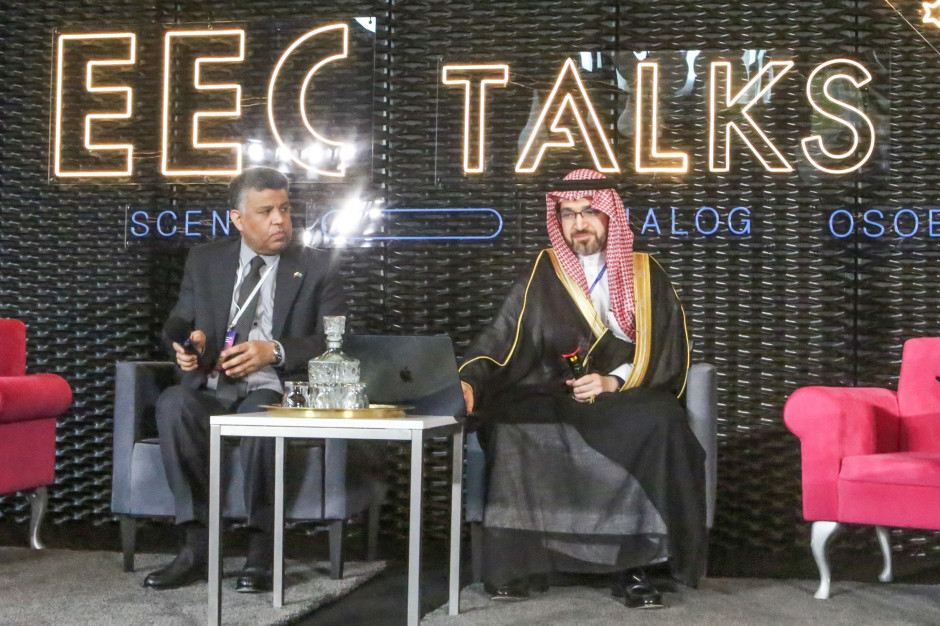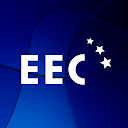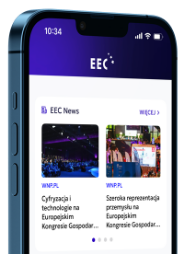Not just Saudi Aramco and oil – the Polish-Saudi opening up
Aleksandra Helbin - 27-05-2024
Saudi Arabia is currently the largest supplier of oil to Poland. Saudi Aramco in the Gdańsk refinery is the largest Saudi investment on the Vistula. However, the potential of bilateral relations does not stop there. To revive them, however, we still need to put in a lot of work.
- “Saudi Arabia has a great deal to offer the world. It can show great development in many different fields,” said the Ambassador of the Kingdom of Saudi Arabia to Poland, Saad Saleh Alsaleh, on the EEC Talks stage during the European Economic Congress.
- “Not only oil, but also green technologies and the ICT sector can become the basis of the Saudi-Polish relationship,” said Yaser Faquih, Deputy Minister of Research and Economic Insights at the Ministry of Economy and Planning of Saudi Arabia.
- The launch of regular flights between the two countries in June will be crucial in further strengthening the Polish-Saudi relations. “This will greatly facilitate access to both countries, which will also translate into economic benefits,” said Robert Rostek, Polish ambassador to the Kingdom of Saudi Arabia.
Since 2023, the Kingdom of Saudi Arabia has been Poland’s most important raw material partner, supplying nearly half of our country’s oil. By taking a stake in the Gdańsk refinery, the world’s largest company, the state-owned petrochemical giant Saudi Aramco, also entered Poland, opening a new chapter in the Polish-Saudi relations.
Saudi Arabia is changing its image and opening up to the world.
However, the partnership between Poland and Saudi Arabia should not rely on raw materials only, as the Kingdom itself is changing. In line with the Saudi Vision 2030, a strategy outlined by Crown Prince Muhammad ibn Salman, the country is undergoing an unprecedented process of transformation aimed at diversifying the Saudi economy and becoming less dependent on fossil fuel revenues. This opens up completely new opportunities for Polish companies.
In order to take advantage of them, however, it is first necessary to get to know the partner and to understand the specifics of the Kingdom’s market and culture, because in Poland, knowledge of Saudi Arabia is still modest and many stereotypes persist.
“We inherited these stereotypes from previous generations, but now our region is trying to change this image. The younger generation, who are using new technologies, getting information from different sources, are discovering that the change in Saudi Arabia is significant. The people and society are already very different,” Saad Saleh Alsaleh, Ambassador of the Kingdom of Saudi Arabia to Poland, said on the EEC Talks stage during the European Economic Congress.
This is also helped by the international events that will be organised in the country. It may be recalled that Saudi Arabia will host the next World Expo in 2030 and the 2034 FIFA World Cup. These high-profile events will not only attract thousands of people to the Kingdom, but also provide an opportunity to demonstrate the country’s new image.
“Saudi Arabia has a great deal to offer the world. It can show great development in many different areas, we are talking about young people, women’s rights, technology, entertainment, sports and many other aspects that are interesting, especially for young people who come and see these changes in Saudi Arabia,” the ambassador stressed.
For Polish companies, the Saudi market remains undiscovered. It is time to change that.
Poland, however, is still modestly taking advantage of the emerging potential for cooperation with the Kingdom. Admittedly, trade turnover between Poland and Saudi Arabia has been growing. Last year it was $8.5 billion compared to less than $7 billion the year before, but this increase was due almost exclusively to oil imports into Poland. Meanwhile, given the potential of the Saudi economy, it could be much more.
“We are all facing similar challenges. We have issues of decarbonisation to address, on a global scale to boot, which necessitates the search for cleaner and greener solutions. As for the global trade landscape itself, let us keep in mind the political issues that are strongly affecting it at the moment. In our region, we have to struggle not only with war across our border, but also with instability in the Red Sea basin, which is disrupting supply chains. This is compounded by the issue of global rivalry between the United States and its allies and China. This is a competition that is important from the point of view of both Poland and Saudi Arabia,” Yaser Faquih, Deputy Minister of Research and Economic Insights at the Ministry of Economy and Planning of Saudi Arabia, said on the EEC Talks stage.
All those challenges open up new opportunities for both countries to work together. Saudi Arabia has some of the best conditions in the world for the development of renewable energy sources, and it also has the know-how that it wants to export worldwide. This is where Poland can be a good partner to help establish cooperation in new markets.
Among other potential areas of Polish-Saudi cooperation, Deputy Minister Faquih pointed to the area of infrastructure, including energy, and the automotive sector.
“Poland is excelling in the area of electromobility, the production of batteries for electric cars. This is another area of potential and future cooperation. That is, it is definitely no longer just oil, but above all technology, investment and financing that can become the basis of our relationship,” Deputy Minister added.
In addition, the tense geopolitical situation is also opening up new areas of cooperation, among which Deputy Minister Faquih mentioned the defence industry, as well as broader security issues, including technological ones.
“Poland and Saudi Arabia can work together in the new technology and ICT industries. Poland is among the leaders in these industries; moreover, nearly a quarter of the Polish population has a university degree. This is a huge potential. Food safety is another common area. When we suddenly lost access to Ukrainian grain after the outbreak of war in Ukraine, we had to source food from other countries. It was a huge shock for us and Poland has a rich heritage and excellent food here,” stressed Deputy Minister Faquih.
A direct air link between Saudi Arabia and Poland will be launched in June.
Undoubtedly, the launch – after months of effort – of regular air links between the two countries will be crucial in further strengthening mutual Polish-Saudi relations. As early as June, travellers will fly the Riyadh-Warsaw route on board LOT for the first time. The Polish carrier will be flying this route three times a week. This is the result of an intergovernmental air services agreement between Poland and the Kingdom of Saudi Arabia signed last August.
The distance between Poland and Saudi Arabia is approximately 5,000 km. Until now, to cover this route, it has been necessary to make transfers at foreign airports and use other countries’ airlines. It will now be possible to get to Riyadh directly on just about a five-hour flight from Warsaw.
“This will greatly facilitate access to both countries, which will also translate into economic benefits,” Robert Rostek, Ambassador of the Republic of Poland to the Kingdom of Saudi Arabia, said at the European Economic Congress, stressing that knowledge of each other is still insufficient on both sides. Therefore, the most important thing now will be to promote Poland and its attractions, mountains, sea, lakes.
Polish companies need to do their own homework on the Saudi market.
“We need to encourage people to travel and discover new places. This is only the beginning of this journey of enhancing cooperation. I think a lot of Polish companies are already ready for the Saudi market and the exploration of the country. Our role, as diplomats, is to encourage them to enter into such cooperation and continue their business activities. However, in order to establish themselves on the Saudi market, Polish companies themselves must do their homework,” Ambassador Rostek said.
As the Polish diplomat stressed, building relationships is crucial in establishing a foundation in the Middle East. You just have to be there, meet with the Saudi authorities, with business partners, to get to know each other better. It is often an arduous and always a lengthy process, but one that always pays off, as the Saudi market guarantees high returns on investment.
Saudi Arabia’s ambassador to Poland, Saad Saleh Alsaleh, also stressed that the launch of direct flights from Warsaw to Riyadh is a major and important step in bilateral relations.
“It will be a bridge that will bring people together. We encourage Poles to visit Saudi Arabia, to experience our culture, to discover new places and to participate in the events we organise, such as the Formula 1 races, the Dakar or the aforementioned FIFA World Cup and the Expo. For the Saudis, a visit to Poland will also be a discovery, they will learn more about the country’s culture and history. With easier travel, there will be no need to transfer, no need to waste time, which will certainly translate into more traffic between our countries, and this will open up new business opportunities, because time is money,” Ambassador Alsaleh added.
It will not end with Saudi Aramco. Poland is an attractive market for Saudi investors.
As emphasised by Deputy Minister Yaser Faquih, direct flights will certainly facilitate the expansion of the other side of the mutual relationship as well, i.e. facilitate access of Saudi investors to the Polish market. So far, Saudi Aramco’s investment in the Gdańsk refinery is the largest Saudi investment in Poland. The world’s largest energy company has taken a 40 per cent stake in the Lotos-owned plant as part of its countermeasures to the merger with Orlen.
“This transaction is first and foremost an opportunity for technology transfer and knowledge exchange. Saudi Aramco is one of the largest companies in the world, we know how to do business in the refining industry in Korea, Japan, China, Europe, the US, where we have the largest refinery in America, Port Arthur, Texas. We thus have knowledge of the latest refining technologies,” enumerated Deputy Minister Faquih, highlighting the possibilities for sharing this experience in Poland.
However, the opportunities do not end there. As the Deputy Minister pointed out, petrochemicals are another natural area of cooperation.
“SABIC, our national champion, can also cooperate with Polish industry, said Yaser Faquih, pointing to the importance of Poland’s location – close to Germany and the Czech Republic, which opens up additional opportunities for cooperation and expansion for Saudi companies. “In my opinion, the next stage of the rivalry between Europe and the West and China will take place precisely in the field of petrochemicals,” the Deputy Minister added.
The Polish market, given its size, access to infrastructure, technology and qualified staff, is attractive to Saudi investors.

